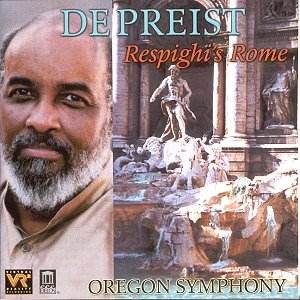Born in Bologna, Respighi travelled widely before eventually
settling in Rome. His musical style is immediately attractive to the
ear, and relates strongly to the evocative colours of Strauss, Ravel,
Puccini and Debussy, as well, of course, to the influence of his illustrious
teachers, Martucci and Rimsky-Korsakov. Stylistically Respighi was undoubtedly
a conservative. He was always attracted by the music of the past, including
the ancient modes and chants, while the sound-world of his music is
harmonically alluring, colourful and sophisticated.
Respighi's reputation rests most securely on his triptych
of symphonic poems inspired by images of Rome: Fountains, Pines and
Festivals. It was Respighi's intention to create music containing many
distinctive technical and expressive characteristics, and he certainly
succeeded, since these three works rank high among the great showpieces
of the orchestral repertory.
The Fountains of Rome is the quietest and most subtle
of the three, with a musical style which if anything relies upon refinement
and under-statement. In that sense it is the most elusive, and makes
particular demands upon the players. James DePreist has been principal
conductor of the Oregon Symphony for more than twenty years - since
1980 to be precise - and their rapport shows. What immediately impresses
is the quality of the sound, both of the recording itself and of the
playing. And since these are the prerequisites for a recording of this
music, the standard set initially is encouraging and satisfying.
The Pines of Rome has a wider expressive and musical
range, set across four movements which each have their own priorities.
The two extremes of the music are Pines near a Catacomb and the Pines
of the Appian Way, the one full of eerie, restrained atmosphere, the
other building to a climax of overwhelming presence and splendour. DePreist
and his orchestra do not disappoint on either occasion, indeed they
and the Delos engineers are wholly successful in capturing Respighi's
imaginative imagery.
The third of the Roman trilogy, Feste Romane (Roman
Festivals), has enjoyed less critical acclaim. But in the hands of a
virtuoso conductor and orchestra its undoubted vulgarities can be triumphantly
indulged. In any case, there is nothing wrong with vulgarity in music;
not everything has to sound like Palestrina.
The performance of Feste Romane was actually made in
1987, some time before the remainder of the disc, and there is no question
that the attentive listener will notice that the sound is less vivid,
although still thoroughly acceptable. Again DePreist has the music's
measure, and his orchestra shows itself to have a pedigree of truly
international calibre.
Terry Barfoot
See also
reviews by John Quinn and Christopher Thomas

![]() Oregon Symphony Orchestra/James
DePreist
Oregon Symphony Orchestra/James
DePreist ![]() DELOS DE 3287 [65.50]
DELOS DE 3287 [65.50]